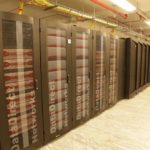Rockport Networks today announced that Durham University’s Institute for Computational Cosmology (ICC) has selected the Rockport Switchless Network as part of the ExCALIBUR program around new networking technologies for its COSMA7 supercomputer at the DiRAC HPC facility. The 232 Rockport nodes are intended to reduce congestion in the COSMA7 cluster and as they model exascale workloads and use codes to run […]
UK’s Durham University Using Rockport Switchless Network for COSMA7 Workload Modeling
Research Centers at Cambridge and Durham Universities Add Nvidia, Dell EMC HPC Resources
At Nvidia’s GTC conference this week, Nvidia and Dell EMC released details of HPC installations at two UK academic supercomputing centers to accelerate computing resources at the two sites. At Durham University, the COSMA-8 supercomputer — to be used by cosmologists researching the origins of the universe — will be accelerated by Nvidia HDR InfiniBand […]
HPE Powers Research at DiRAC HPC Facility
“At HPE, we’ve seen many organizations struggle with technology that couldn’t handle enormous volumes of data. As a national facility serving a large research community, DiRAC needed HPC solutions that could manage complex workloads without the risk of downtime. It also needed more computing power, better storage capabilities, and faster processing to allow its researchers to compete internationally.”
40 Powers of 10 – Simulating the Universe with the DiRAC HPC Facility
Mark Wilkinson from DiRAC gave this talk at the Swiss HPC Conference. “DiRAC is the integrated supercomputing facility for theoretical modeling and HPC-based research in particle physics, and astrophysics, cosmology, and nuclear physics, all areas in which the UK is world-leading. DiRAC provides a variety of compute resources, matching machine architecture to the algorithm design and requirements of the research problems to be solved.”
Dr Debora Sijacki wins 2019 PRACE Ada Lovelace Award for HPC
Today the European PRACE initiative announced that Dr Debora Sijacki from the University of Cambridge will receive the 2019 PRACE Ada Lovelace Award for HPC for her outstanding contributions to and impact on high performance computing in Europe. As a computational cosmologist she has achieved numerous high-impact results in astrophysics based on numerical simulations on state-of-the-art supercomputers.
Upcycled COSMA6 Supercomputer Finds New Life at Durham University
Where do old supercomputers go after the new machines are installed? At Durham University in the UK, they move on to a whole new mission in computational discovery. “COSMA6 enables researchers to extend large-scale structure simulations of the evolution of the universe, analyze data from gravitational wave detectors, and simulate the Sun and planets in the solar system. COSMA6 is live and operational from April 2017.”









